Blog Writing: Dramatic Irony
VerifiedAdded on 2019/10/01
|8
|2656
|430
Essay
AI Summary
This essay comprehensively explores the concept of dramatic irony in literature and film. It defines dramatic irony as a literary device where the audience possesses more knowledge than the characters, leading to heightened suspense, humor, or tragedy. The essay differentiates dramatic irony from situational and verbal irony, providing numerous examples from classic literature (Shakespeare's Romeo and Juliet, Hamlet, King Lear), popular films (Star Wars, Toy Story, Hitchcock films), and television shows (Smallville). It analyzes how dramatic irony is employed to create suspense, build tension, and develop compelling turning points in narratives. The essay also discusses the intentional use of dramatic irony by authors and filmmakers to engage audiences and maintain their interest throughout a story or film, highlighting its effectiveness in generating emotional responses and enhancing the overall impact of the work.
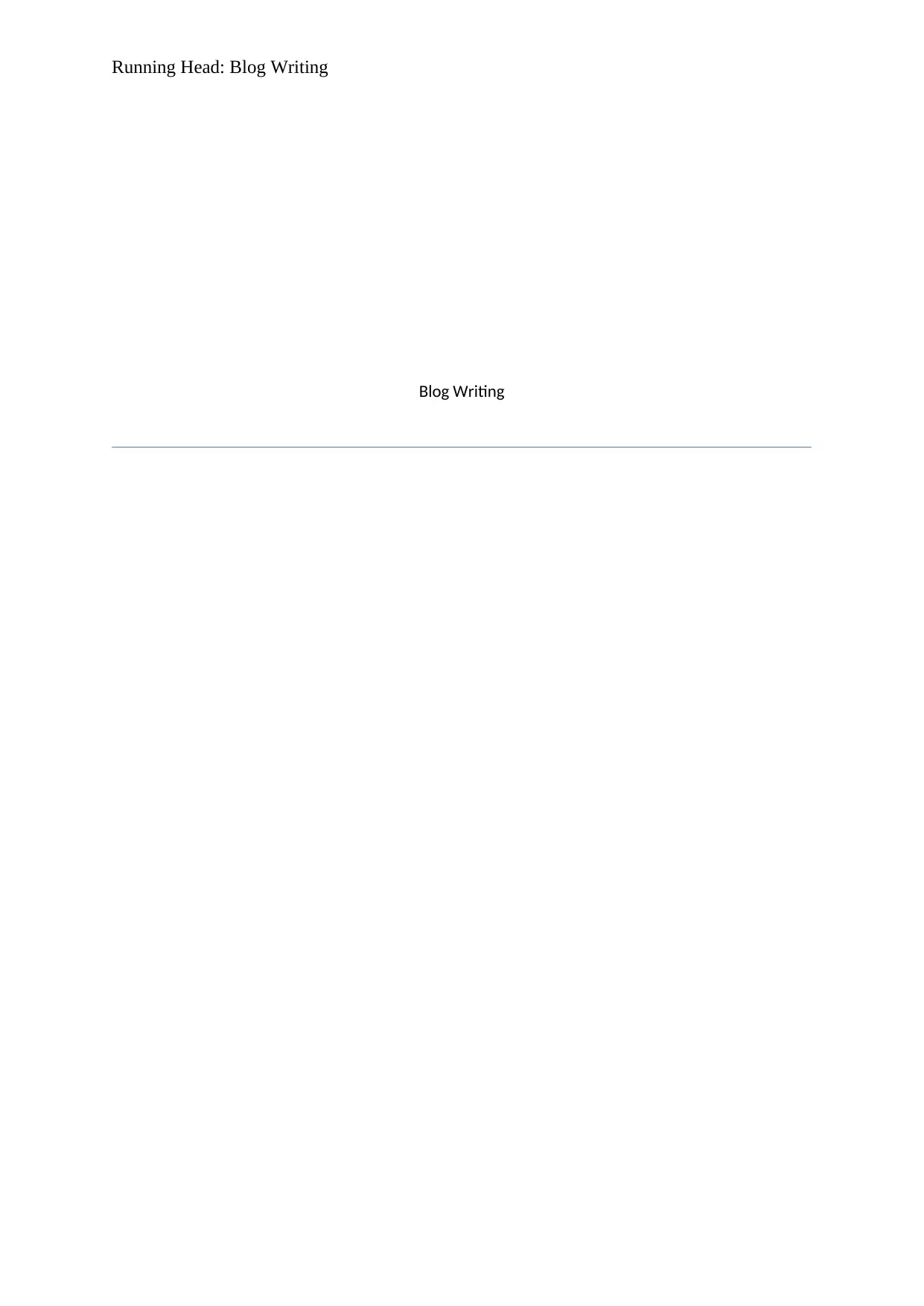
Running Head: Blog Writing
Blog Writing
Blog Writing
Paraphrase This Document
Need a fresh take? Get an instant paraphrase of this document with our AI Paraphraser
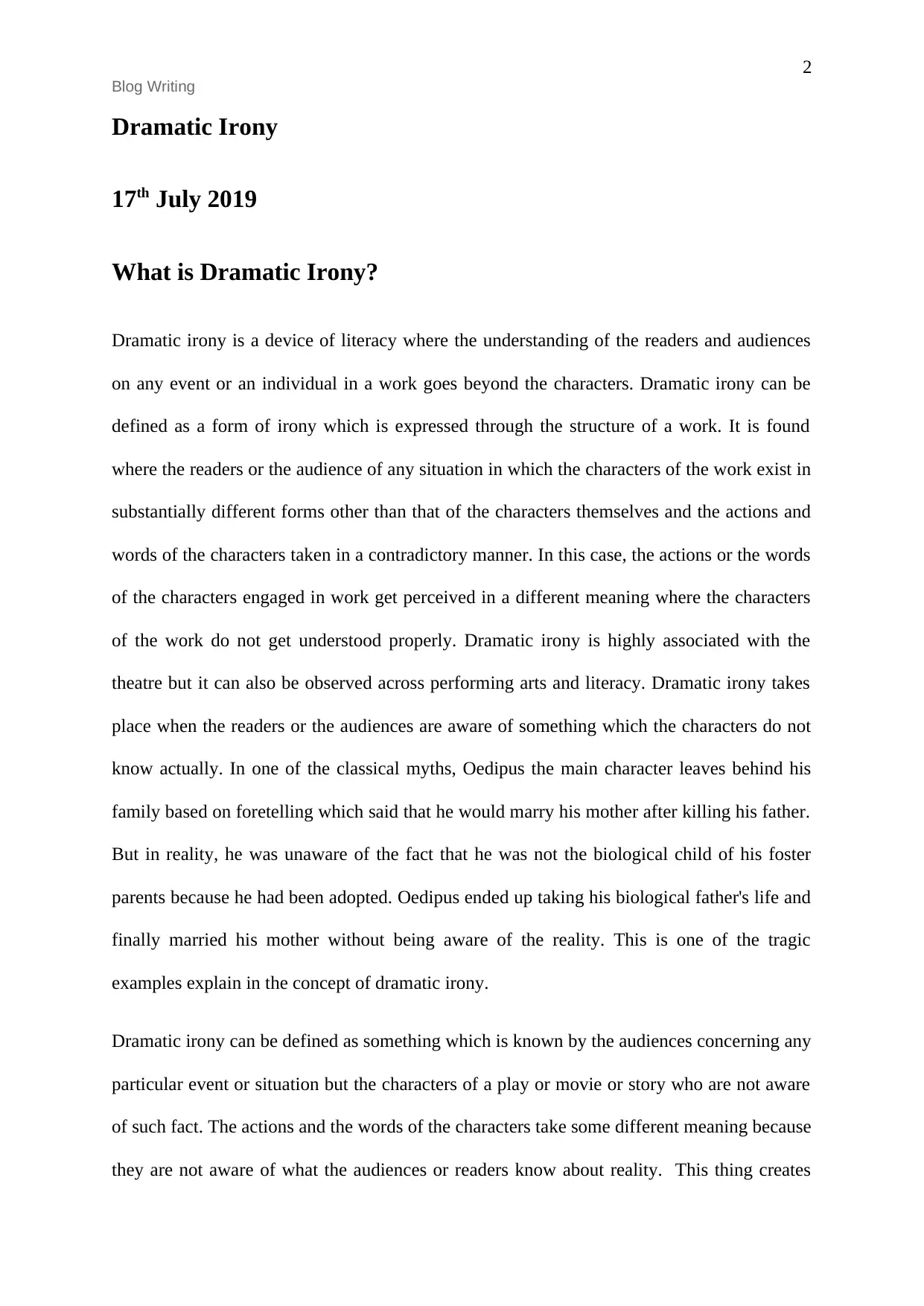
2
Blog Writing
Dramatic Irony
17th July 2019
What is Dramatic Irony?
Dramatic irony is a device of literacy where the understanding of the readers and audiences
on any event or an individual in a work goes beyond the characters. Dramatic irony can be
defined as a form of irony which is expressed through the structure of a work. It is found
where the readers or the audience of any situation in which the characters of the work exist in
substantially different forms other than that of the characters themselves and the actions and
words of the characters taken in a contradictory manner. In this case, the actions or the words
of the characters engaged in work get perceived in a different meaning where the characters
of the work do not get understood properly. Dramatic irony is highly associated with the
theatre but it can also be observed across performing arts and literacy. Dramatic irony takes
place when the readers or the audiences are aware of something which the characters do not
know actually. In one of the classical myths, Oedipus the main character leaves behind his
family based on foretelling which said that he would marry his mother after killing his father.
But in reality, he was unaware of the fact that he was not the biological child of his foster
parents because he had been adopted. Oedipus ended up taking his biological father's life and
finally married his mother without being aware of the reality. This is one of the tragic
examples explain in the concept of dramatic irony.
Dramatic irony can be defined as something which is known by the audiences concerning any
particular event or situation but the characters of a play or movie or story who are not aware
of such fact. The actions and the words of the characters take some different meaning because
they are not aware of what the audiences or readers know about reality. This thing creates
Blog Writing
Dramatic Irony
17th July 2019
What is Dramatic Irony?
Dramatic irony is a device of literacy where the understanding of the readers and audiences
on any event or an individual in a work goes beyond the characters. Dramatic irony can be
defined as a form of irony which is expressed through the structure of a work. It is found
where the readers or the audience of any situation in which the characters of the work exist in
substantially different forms other than that of the characters themselves and the actions and
words of the characters taken in a contradictory manner. In this case, the actions or the words
of the characters engaged in work get perceived in a different meaning where the characters
of the work do not get understood properly. Dramatic irony is highly associated with the
theatre but it can also be observed across performing arts and literacy. Dramatic irony takes
place when the readers or the audiences are aware of something which the characters do not
know actually. In one of the classical myths, Oedipus the main character leaves behind his
family based on foretelling which said that he would marry his mother after killing his father.
But in reality, he was unaware of the fact that he was not the biological child of his foster
parents because he had been adopted. Oedipus ended up taking his biological father's life and
finally married his mother without being aware of the reality. This is one of the tragic
examples explain in the concept of dramatic irony.
Dramatic irony can be defined as something which is known by the audiences concerning any
particular event or situation but the characters of a play or movie or story who are not aware
of such fact. The actions and the words of the characters take some different meaning because
they are not aware of what the audiences or readers know about reality. This thing creates
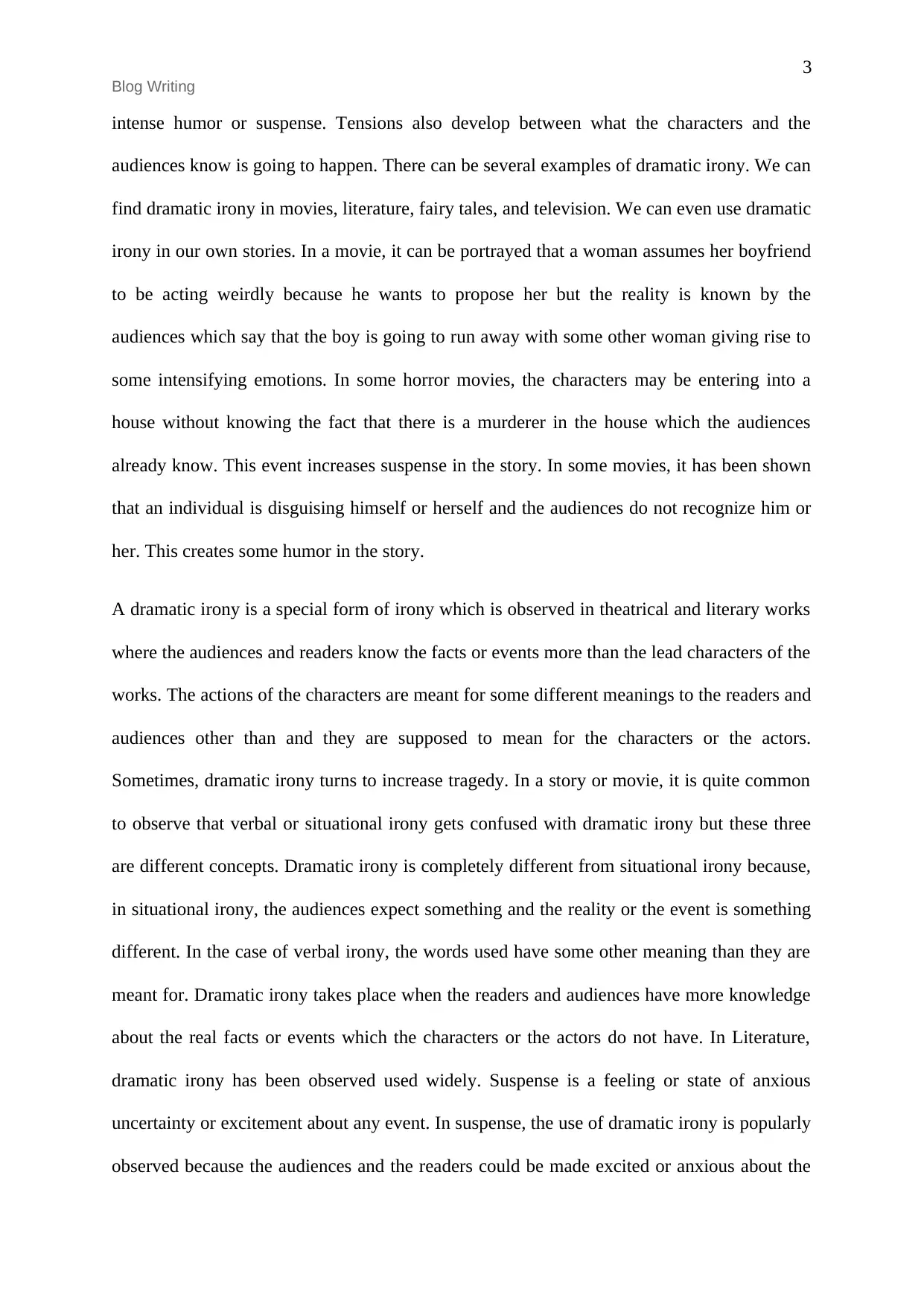
3
Blog Writing
intense humor or suspense. Tensions also develop between what the characters and the
audiences know is going to happen. There can be several examples of dramatic irony. We can
find dramatic irony in movies, literature, fairy tales, and television. We can even use dramatic
irony in our own stories. In a movie, it can be portrayed that a woman assumes her boyfriend
to be acting weirdly because he wants to propose her but the reality is known by the
audiences which say that the boy is going to run away with some other woman giving rise to
some intensifying emotions. In some horror movies, the characters may be entering into a
house without knowing the fact that there is a murderer in the house which the audiences
already know. This event increases suspense in the story. In some movies, it has been shown
that an individual is disguising himself or herself and the audiences do not recognize him or
her. This creates some humor in the story.
A dramatic irony is a special form of irony which is observed in theatrical and literary works
where the audiences and readers know the facts or events more than the lead characters of the
works. The actions of the characters are meant for some different meanings to the readers and
audiences other than and they are supposed to mean for the characters or the actors.
Sometimes, dramatic irony turns to increase tragedy. In a story or movie, it is quite common
to observe that verbal or situational irony gets confused with dramatic irony but these three
are different concepts. Dramatic irony is completely different from situational irony because,
in situational irony, the audiences expect something and the reality or the event is something
different. In the case of verbal irony, the words used have some other meaning than they are
meant for. Dramatic irony takes place when the readers and audiences have more knowledge
about the real facts or events which the characters or the actors do not have. In Literature,
dramatic irony has been observed used widely. Suspense is a feeling or state of anxious
uncertainty or excitement about any event. In suspense, the use of dramatic irony is popularly
observed because the audiences and the readers could be made excited or anxious about the
Blog Writing
intense humor or suspense. Tensions also develop between what the characters and the
audiences know is going to happen. There can be several examples of dramatic irony. We can
find dramatic irony in movies, literature, fairy tales, and television. We can even use dramatic
irony in our own stories. In a movie, it can be portrayed that a woman assumes her boyfriend
to be acting weirdly because he wants to propose her but the reality is known by the
audiences which say that the boy is going to run away with some other woman giving rise to
some intensifying emotions. In some horror movies, the characters may be entering into a
house without knowing the fact that there is a murderer in the house which the audiences
already know. This event increases suspense in the story. In some movies, it has been shown
that an individual is disguising himself or herself and the audiences do not recognize him or
her. This creates some humor in the story.
A dramatic irony is a special form of irony which is observed in theatrical and literary works
where the audiences and readers know the facts or events more than the lead characters of the
works. The actions of the characters are meant for some different meanings to the readers and
audiences other than and they are supposed to mean for the characters or the actors.
Sometimes, dramatic irony turns to increase tragedy. In a story or movie, it is quite common
to observe that verbal or situational irony gets confused with dramatic irony but these three
are different concepts. Dramatic irony is completely different from situational irony because,
in situational irony, the audiences expect something and the reality or the event is something
different. In the case of verbal irony, the words used have some other meaning than they are
meant for. Dramatic irony takes place when the readers and audiences have more knowledge
about the real facts or events which the characters or the actors do not have. In Literature,
dramatic irony has been observed used widely. Suspense is a feeling or state of anxious
uncertainty or excitement about any event. In suspense, the use of dramatic irony is popularly
observed because the audiences and the readers could be made excited or anxious about the
⊘ This is a preview!⊘
Do you want full access?
Subscribe today to unlock all pages.

Trusted by 1+ million students worldwide
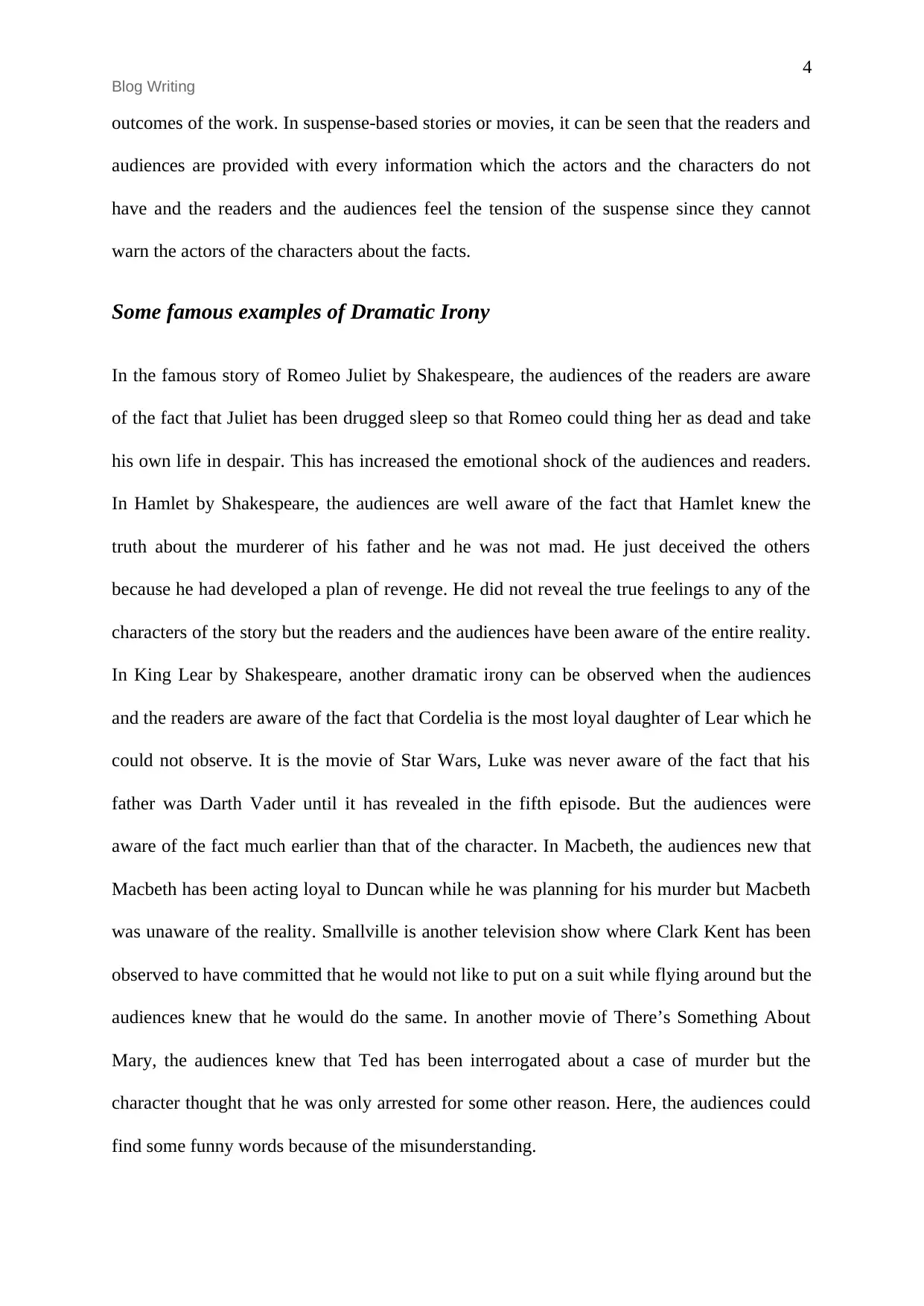
4
Blog Writing
outcomes of the work. In suspense-based stories or movies, it can be seen that the readers and
audiences are provided with every information which the actors and the characters do not
have and the readers and the audiences feel the tension of the suspense since they cannot
warn the actors of the characters about the facts.
Some famous examples of Dramatic Irony
In the famous story of Romeo Juliet by Shakespeare, the audiences of the readers are aware
of the fact that Juliet has been drugged sleep so that Romeo could thing her as dead and take
his own life in despair. This has increased the emotional shock of the audiences and readers.
In Hamlet by Shakespeare, the audiences are well aware of the fact that Hamlet knew the
truth about the murderer of his father and he was not mad. He just deceived the others
because he had developed a plan of revenge. He did not reveal the true feelings to any of the
characters of the story but the readers and the audiences have been aware of the entire reality.
In King Lear by Shakespeare, another dramatic irony can be observed when the audiences
and the readers are aware of the fact that Cordelia is the most loyal daughter of Lear which he
could not observe. It is the movie of Star Wars, Luke was never aware of the fact that his
father was Darth Vader until it has revealed in the fifth episode. But the audiences were
aware of the fact much earlier than that of the character. In Macbeth, the audiences new that
Macbeth has been acting loyal to Duncan while he was planning for his murder but Macbeth
was unaware of the reality. Smallville is another television show where Clark Kent has been
observed to have committed that he would not like to put on a suit while flying around but the
audiences knew that he would do the same. In another movie of There’s Something About
Mary, the audiences knew that Ted has been interrogated about a case of murder but the
character thought that he was only arrested for some other reason. Here, the audiences could
find some funny words because of the misunderstanding.
Blog Writing
outcomes of the work. In suspense-based stories or movies, it can be seen that the readers and
audiences are provided with every information which the actors and the characters do not
have and the readers and the audiences feel the tension of the suspense since they cannot
warn the actors of the characters about the facts.
Some famous examples of Dramatic Irony
In the famous story of Romeo Juliet by Shakespeare, the audiences of the readers are aware
of the fact that Juliet has been drugged sleep so that Romeo could thing her as dead and take
his own life in despair. This has increased the emotional shock of the audiences and readers.
In Hamlet by Shakespeare, the audiences are well aware of the fact that Hamlet knew the
truth about the murderer of his father and he was not mad. He just deceived the others
because he had developed a plan of revenge. He did not reveal the true feelings to any of the
characters of the story but the readers and the audiences have been aware of the entire reality.
In King Lear by Shakespeare, another dramatic irony can be observed when the audiences
and the readers are aware of the fact that Cordelia is the most loyal daughter of Lear which he
could not observe. It is the movie of Star Wars, Luke was never aware of the fact that his
father was Darth Vader until it has revealed in the fifth episode. But the audiences were
aware of the fact much earlier than that of the character. In Macbeth, the audiences new that
Macbeth has been acting loyal to Duncan while he was planning for his murder but Macbeth
was unaware of the reality. Smallville is another television show where Clark Kent has been
observed to have committed that he would not like to put on a suit while flying around but the
audiences knew that he would do the same. In another movie of There’s Something About
Mary, the audiences knew that Ted has been interrogated about a case of murder but the
character thought that he was only arrested for some other reason. Here, the audiences could
find some funny words because of the misunderstanding.
Paraphrase This Document
Need a fresh take? Get an instant paraphrase of this document with our AI Paraphraser
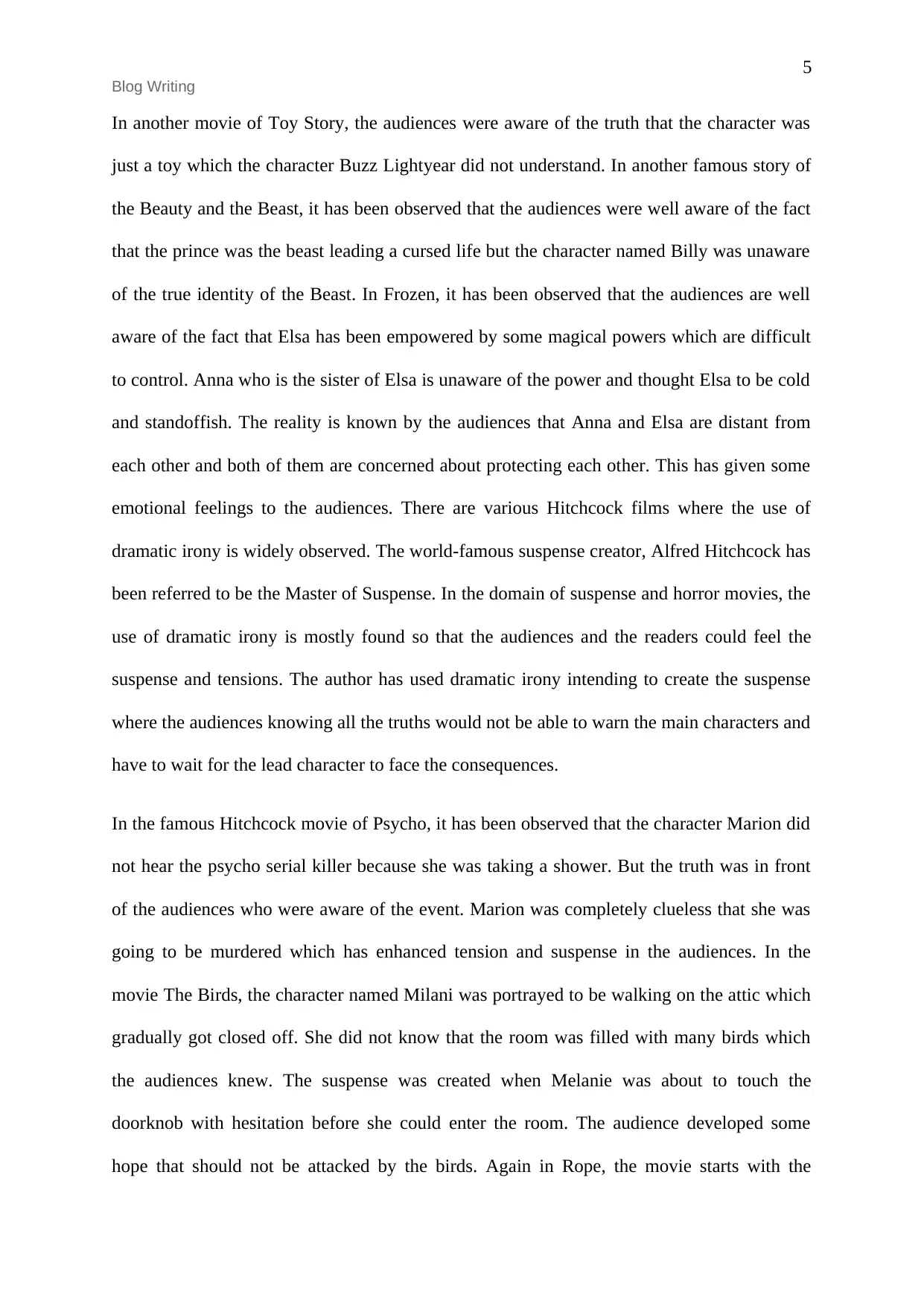
5
Blog Writing
In another movie of Toy Story, the audiences were aware of the truth that the character was
just a toy which the character Buzz Lightyear did not understand. In another famous story of
the Beauty and the Beast, it has been observed that the audiences were well aware of the fact
that the prince was the beast leading a cursed life but the character named Billy was unaware
of the true identity of the Beast. In Frozen, it has been observed that the audiences are well
aware of the fact that Elsa has been empowered by some magical powers which are difficult
to control. Anna who is the sister of Elsa is unaware of the power and thought Elsa to be cold
and standoffish. The reality is known by the audiences that Anna and Elsa are distant from
each other and both of them are concerned about protecting each other. This has given some
emotional feelings to the audiences. There are various Hitchcock films where the use of
dramatic irony is widely observed. The world-famous suspense creator, Alfred Hitchcock has
been referred to be the Master of Suspense. In the domain of suspense and horror movies, the
use of dramatic irony is mostly found so that the audiences and the readers could feel the
suspense and tensions. The author has used dramatic irony intending to create the suspense
where the audiences knowing all the truths would not be able to warn the main characters and
have to wait for the lead character to face the consequences.
In the famous Hitchcock movie of Psycho, it has been observed that the character Marion did
not hear the psycho serial killer because she was taking a shower. But the truth was in front
of the audiences who were aware of the event. Marion was completely clueless that she was
going to be murdered which has enhanced tension and suspense in the audiences. In the
movie The Birds, the character named Milani was portrayed to be walking on the attic which
gradually got closed off. She did not know that the room was filled with many birds which
the audiences knew. The suspense was created when Melanie was about to touch the
doorknob with hesitation before she could enter the room. The audience developed some
hope that should not be attacked by the birds. Again in Rope, the movie starts with the
Blog Writing
In another movie of Toy Story, the audiences were aware of the truth that the character was
just a toy which the character Buzz Lightyear did not understand. In another famous story of
the Beauty and the Beast, it has been observed that the audiences were well aware of the fact
that the prince was the beast leading a cursed life but the character named Billy was unaware
of the true identity of the Beast. In Frozen, it has been observed that the audiences are well
aware of the fact that Elsa has been empowered by some magical powers which are difficult
to control. Anna who is the sister of Elsa is unaware of the power and thought Elsa to be cold
and standoffish. The reality is known by the audiences that Anna and Elsa are distant from
each other and both of them are concerned about protecting each other. This has given some
emotional feelings to the audiences. There are various Hitchcock films where the use of
dramatic irony is widely observed. The world-famous suspense creator, Alfred Hitchcock has
been referred to be the Master of Suspense. In the domain of suspense and horror movies, the
use of dramatic irony is mostly found so that the audiences and the readers could feel the
suspense and tensions. The author has used dramatic irony intending to create the suspense
where the audiences knowing all the truths would not be able to warn the main characters and
have to wait for the lead character to face the consequences.
In the famous Hitchcock movie of Psycho, it has been observed that the character Marion did
not hear the psycho serial killer because she was taking a shower. But the truth was in front
of the audiences who were aware of the event. Marion was completely clueless that she was
going to be murdered which has enhanced tension and suspense in the audiences. In the
movie The Birds, the character named Milani was portrayed to be walking on the attic which
gradually got closed off. She did not know that the room was filled with many birds which
the audiences knew. The suspense was created when Melanie was about to touch the
doorknob with hesitation before she could enter the room. The audience developed some
hope that should not be attacked by the birds. Again in Rope, the movie starts with the
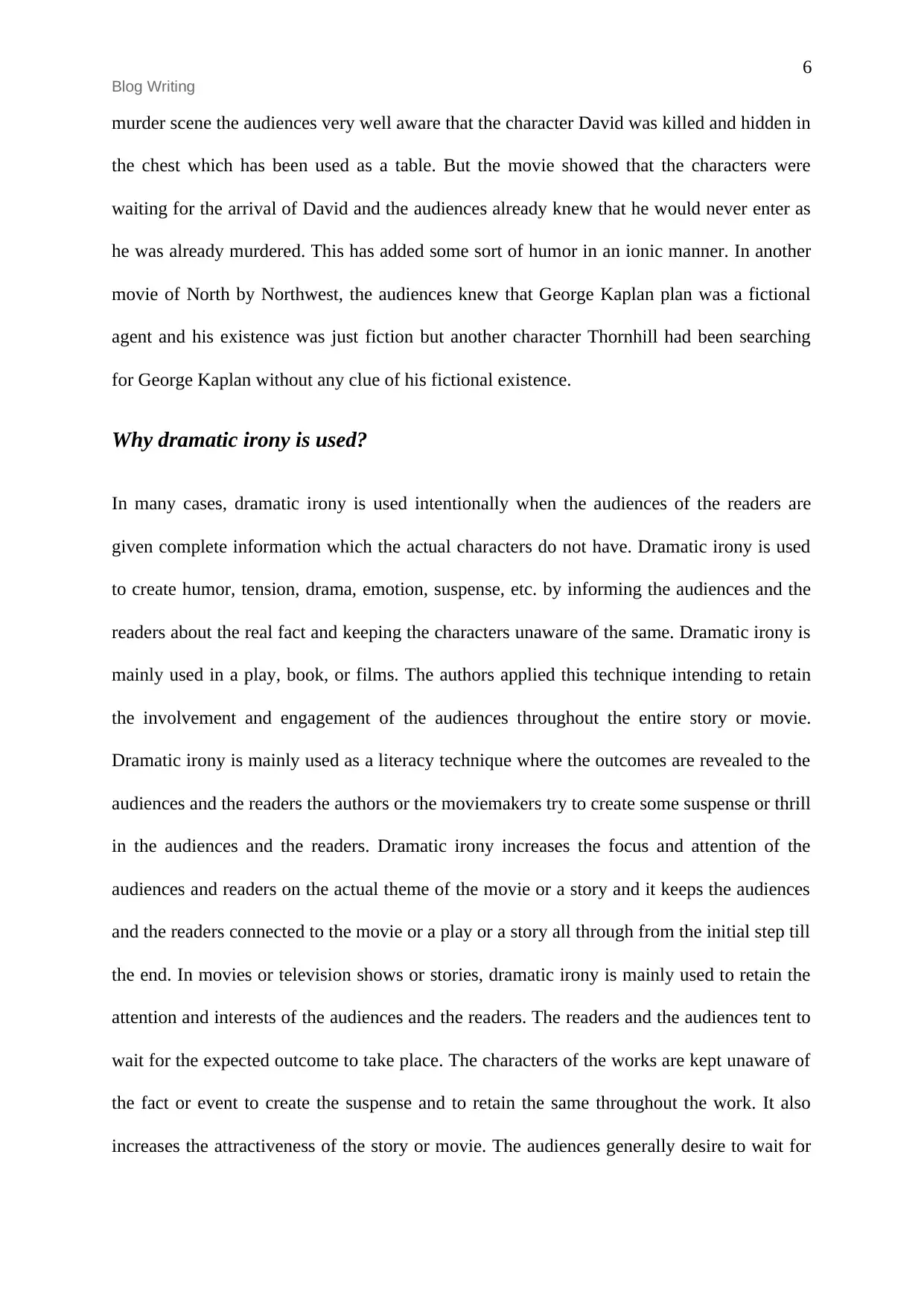
6
Blog Writing
murder scene the audiences very well aware that the character David was killed and hidden in
the chest which has been used as a table. But the movie showed that the characters were
waiting for the arrival of David and the audiences already knew that he would never enter as
he was already murdered. This has added some sort of humor in an ionic manner. In another
movie of North by Northwest, the audiences knew that George Kaplan plan was a fictional
agent and his existence was just fiction but another character Thornhill had been searching
for George Kaplan without any clue of his fictional existence.
Why dramatic irony is used?
In many cases, dramatic irony is used intentionally when the audiences of the readers are
given complete information which the actual characters do not have. Dramatic irony is used
to create humor, tension, drama, emotion, suspense, etc. by informing the audiences and the
readers about the real fact and keeping the characters unaware of the same. Dramatic irony is
mainly used in a play, book, or films. The authors applied this technique intending to retain
the involvement and engagement of the audiences throughout the entire story or movie.
Dramatic irony is mainly used as a literacy technique where the outcomes are revealed to the
audiences and the readers the authors or the moviemakers try to create some suspense or thrill
in the audiences and the readers. Dramatic irony increases the focus and attention of the
audiences and readers on the actual theme of the movie or a story and it keeps the audiences
and the readers connected to the movie or a play or a story all through from the initial step till
the end. In movies or television shows or stories, dramatic irony is mainly used to retain the
attention and interests of the audiences and the readers. The readers and the audiences tent to
wait for the expected outcome to take place. The characters of the works are kept unaware of
the fact or event to create the suspense and to retain the same throughout the work. It also
increases the attractiveness of the story or movie. The audiences generally desire to wait for
Blog Writing
murder scene the audiences very well aware that the character David was killed and hidden in
the chest which has been used as a table. But the movie showed that the characters were
waiting for the arrival of David and the audiences already knew that he would never enter as
he was already murdered. This has added some sort of humor in an ionic manner. In another
movie of North by Northwest, the audiences knew that George Kaplan plan was a fictional
agent and his existence was just fiction but another character Thornhill had been searching
for George Kaplan without any clue of his fictional existence.
Why dramatic irony is used?
In many cases, dramatic irony is used intentionally when the audiences of the readers are
given complete information which the actual characters do not have. Dramatic irony is used
to create humor, tension, drama, emotion, suspense, etc. by informing the audiences and the
readers about the real fact and keeping the characters unaware of the same. Dramatic irony is
mainly used in a play, book, or films. The authors applied this technique intending to retain
the involvement and engagement of the audiences throughout the entire story or movie.
Dramatic irony is mainly used as a literacy technique where the outcomes are revealed to the
audiences and the readers the authors or the moviemakers try to create some suspense or thrill
in the audiences and the readers. Dramatic irony increases the focus and attention of the
audiences and readers on the actual theme of the movie or a story and it keeps the audiences
and the readers connected to the movie or a play or a story all through from the initial step till
the end. In movies or television shows or stories, dramatic irony is mainly used to retain the
attention and interests of the audiences and the readers. The readers and the audiences tent to
wait for the expected outcome to take place. The characters of the works are kept unaware of
the fact or event to create the suspense and to retain the same throughout the work. It also
increases the attractiveness of the story or movie. The audiences generally desire to wait for
⊘ This is a preview!⊘
Do you want full access?
Subscribe today to unlock all pages.

Trusted by 1+ million students worldwide
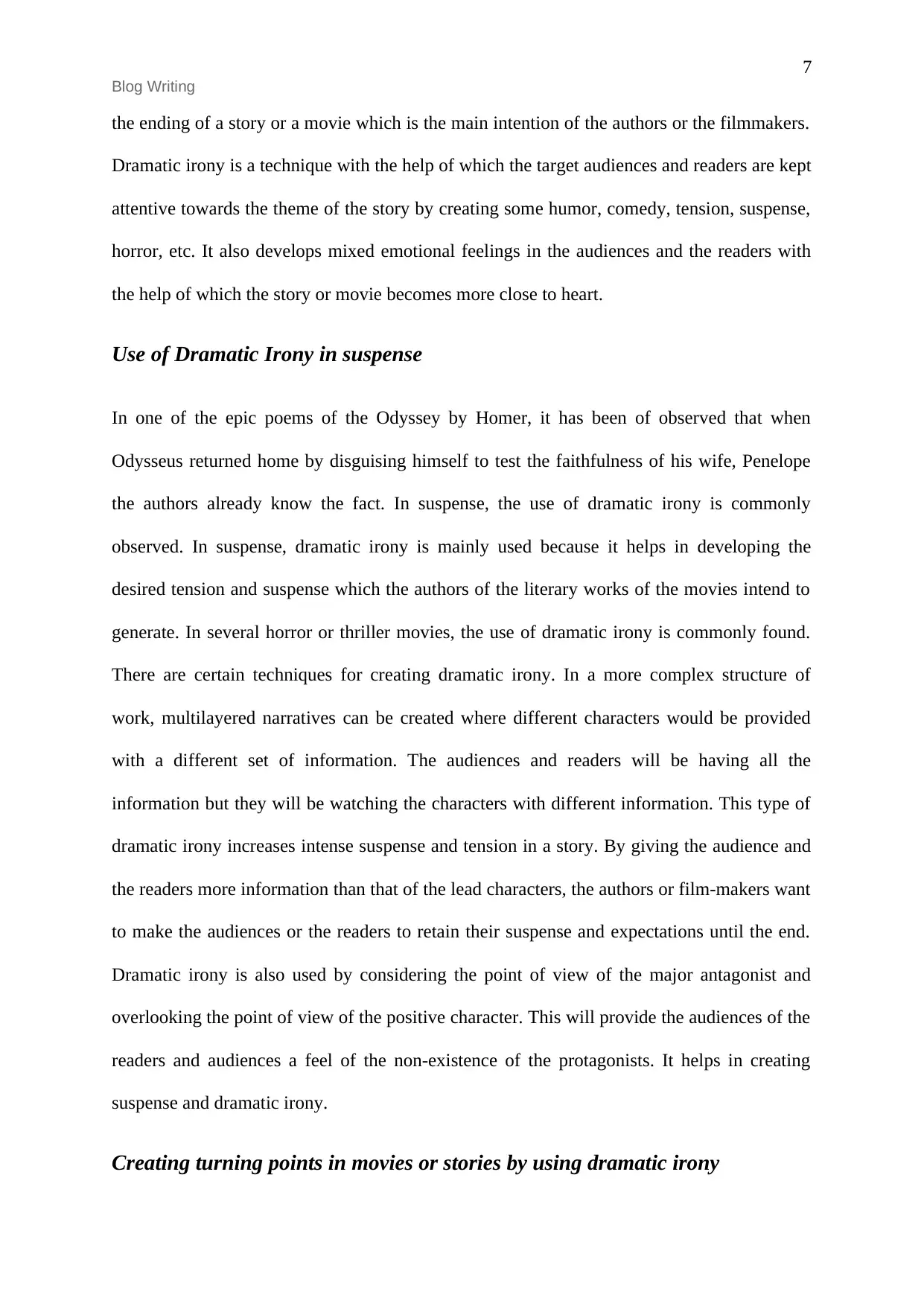
7
Blog Writing
the ending of a story or a movie which is the main intention of the authors or the filmmakers.
Dramatic irony is a technique with the help of which the target audiences and readers are kept
attentive towards the theme of the story by creating some humor, comedy, tension, suspense,
horror, etc. It also develops mixed emotional feelings in the audiences and the readers with
the help of which the story or movie becomes more close to heart.
Use of Dramatic Irony in suspense
In one of the epic poems of the Odyssey by Homer, it has been of observed that when
Odysseus returned home by disguising himself to test the faithfulness of his wife, Penelope
the authors already know the fact. In suspense, the use of dramatic irony is commonly
observed. In suspense, dramatic irony is mainly used because it helps in developing the
desired tension and suspense which the authors of the literary works of the movies intend to
generate. In several horror or thriller movies, the use of dramatic irony is commonly found.
There are certain techniques for creating dramatic irony. In a more complex structure of
work, multilayered narratives can be created where different characters would be provided
with a different set of information. The audiences and readers will be having all the
information but they will be watching the characters with different information. This type of
dramatic irony increases intense suspense and tension in a story. By giving the audience and
the readers more information than that of the lead characters, the authors or film-makers want
to make the audiences or the readers to retain their suspense and expectations until the end.
Dramatic irony is also used by considering the point of view of the major antagonist and
overlooking the point of view of the positive character. This will provide the audiences of the
readers and audiences a feel of the non-existence of the protagonists. It helps in creating
suspense and dramatic irony.
Creating turning points in movies or stories by using dramatic irony
Blog Writing
the ending of a story or a movie which is the main intention of the authors or the filmmakers.
Dramatic irony is a technique with the help of which the target audiences and readers are kept
attentive towards the theme of the story by creating some humor, comedy, tension, suspense,
horror, etc. It also develops mixed emotional feelings in the audiences and the readers with
the help of which the story or movie becomes more close to heart.
Use of Dramatic Irony in suspense
In one of the epic poems of the Odyssey by Homer, it has been of observed that when
Odysseus returned home by disguising himself to test the faithfulness of his wife, Penelope
the authors already know the fact. In suspense, the use of dramatic irony is commonly
observed. In suspense, dramatic irony is mainly used because it helps in developing the
desired tension and suspense which the authors of the literary works of the movies intend to
generate. In several horror or thriller movies, the use of dramatic irony is commonly found.
There are certain techniques for creating dramatic irony. In a more complex structure of
work, multilayered narratives can be created where different characters would be provided
with a different set of information. The audiences and readers will be having all the
information but they will be watching the characters with different information. This type of
dramatic irony increases intense suspense and tension in a story. By giving the audience and
the readers more information than that of the lead characters, the authors or film-makers want
to make the audiences or the readers to retain their suspense and expectations until the end.
Dramatic irony is also used by considering the point of view of the major antagonist and
overlooking the point of view of the positive character. This will provide the audiences of the
readers and audiences a feel of the non-existence of the protagonists. It helps in creating
suspense and dramatic irony.
Creating turning points in movies or stories by using dramatic irony
Paraphrase This Document
Need a fresh take? Get an instant paraphrase of this document with our AI Paraphraser
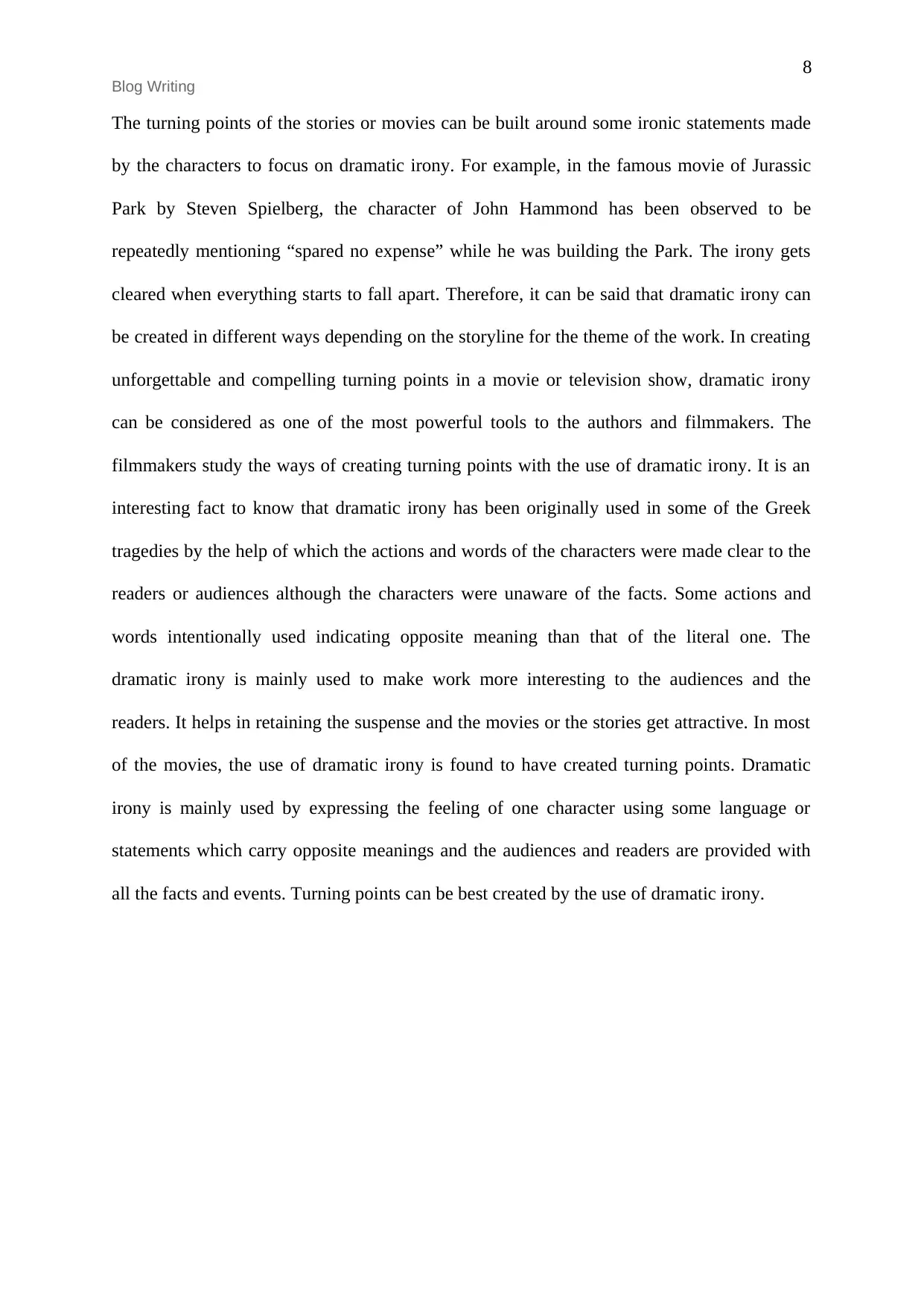
8
Blog Writing
The turning points of the stories or movies can be built around some ironic statements made
by the characters to focus on dramatic irony. For example, in the famous movie of Jurassic
Park by Steven Spielberg, the character of John Hammond has been observed to be
repeatedly mentioning “spared no expense” while he was building the Park. The irony gets
cleared when everything starts to fall apart. Therefore, it can be said that dramatic irony can
be created in different ways depending on the storyline for the theme of the work. In creating
unforgettable and compelling turning points in a movie or television show, dramatic irony
can be considered as one of the most powerful tools to the authors and filmmakers. The
filmmakers study the ways of creating turning points with the use of dramatic irony. It is an
interesting fact to know that dramatic irony has been originally used in some of the Greek
tragedies by the help of which the actions and words of the characters were made clear to the
readers or audiences although the characters were unaware of the facts. Some actions and
words intentionally used indicating opposite meaning than that of the literal one. The
dramatic irony is mainly used to make work more interesting to the audiences and the
readers. It helps in retaining the suspense and the movies or the stories get attractive. In most
of the movies, the use of dramatic irony is found to have created turning points. Dramatic
irony is mainly used by expressing the feeling of one character using some language or
statements which carry opposite meanings and the audiences and readers are provided with
all the facts and events. Turning points can be best created by the use of dramatic irony.
Blog Writing
The turning points of the stories or movies can be built around some ironic statements made
by the characters to focus on dramatic irony. For example, in the famous movie of Jurassic
Park by Steven Spielberg, the character of John Hammond has been observed to be
repeatedly mentioning “spared no expense” while he was building the Park. The irony gets
cleared when everything starts to fall apart. Therefore, it can be said that dramatic irony can
be created in different ways depending on the storyline for the theme of the work. In creating
unforgettable and compelling turning points in a movie or television show, dramatic irony
can be considered as one of the most powerful tools to the authors and filmmakers. The
filmmakers study the ways of creating turning points with the use of dramatic irony. It is an
interesting fact to know that dramatic irony has been originally used in some of the Greek
tragedies by the help of which the actions and words of the characters were made clear to the
readers or audiences although the characters were unaware of the facts. Some actions and
words intentionally used indicating opposite meaning than that of the literal one. The
dramatic irony is mainly used to make work more interesting to the audiences and the
readers. It helps in retaining the suspense and the movies or the stories get attractive. In most
of the movies, the use of dramatic irony is found to have created turning points. Dramatic
irony is mainly used by expressing the feeling of one character using some language or
statements which carry opposite meanings and the audiences and readers are provided with
all the facts and events. Turning points can be best created by the use of dramatic irony.
1 out of 8
Your All-in-One AI-Powered Toolkit for Academic Success.
+13062052269
info@desklib.com
Available 24*7 on WhatsApp / Email
![[object Object]](/_next/static/media/star-bottom.7253800d.svg)
Unlock your academic potential
Copyright © 2020–2026 A2Z Services. All Rights Reserved. Developed and managed by ZUCOL.


